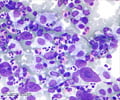The National Institute for Health and Care Excellence has approved GSK’s gene therapy, Strimvelis, as an option to treat a rare immune deficiency condition.
Highlights:
- Strimvelis, gets NICE’s approval as a treatment option for ADA- deficient Severe combined immunodeficiency (ADA-SCID).
- The treatment which costs 594,000 Euros is offered only in one hospital in Milan, Italy.
- The ex-vivo gene therapy involves genetically correcting the defective stem cells of the SCID patient and reinserting them back into the patient.
How does Strimvelis work?
Strimvelis is a gene therapy for ADA deficient SCID that was developed by GlaxoSmithKline. After Glybera, Strimvelis is only the second gene therapy for an inherited disease ever to be approved for sale and the first corrective gene therapy for children to be approved anywhere in the world. Gene therapy is an advanced form of treatment for genetic conditions where the cause of the disease is due to genetic mutations or variations. Gene therapy involves correcting the root cause of the disease at its DNA level. Strimvelis is an ex-vivo gene therapy method where the patient’s bone marrow cells are taken outside of the body and reprogramed to correct the defective copy of the gene in the cells. The reprogramed cells are infused back into the patient. The modified cells now containing the corrected copy of the gene are now able to produce the ADA enzyme and produce immune cells that were previously not being produced as required.Current treatment for SCID
The current treatment for SCID is a bone marrow stem cell transplant which can restore the immune system. However, in order to be successful, there needs to be an exact match between the donor and the recipient. The procedure has a high risk of mortality due to graft and host infection.SCID Overview
Severe combined immunodeficiency or SCID is an inherited genetic condition where the body is not able to produce functional immune cells. This leaves patients at a high risk of developing life threatening and recurrent infections with the slightest of exposures. If left untreated, children usually die before school age. Children with SCID are extremely vulnerable to infections and live in complete isolation to minimize the risk; and hence the nickname “baby in a bubble”.When to opt for Strimvelis
According to theNational Institute for Health and Care Excellence (NICE), Strimvelis is an option to treat SCID when there are no matched stem cell donors for a bone marrow transplant. Despite the sky rocketing cost of 594,000 Euros, NICE believes that the cost is a good value for money given that the treatment offers a lifelong cure for the devastating disease. Moreover, it has to be administered only once and the effects last a lifetime.“Strimvelis represents an important development in the treatment of ADA-SCID, offering the potential to cure the immune aspects of the condition and avoid some of the disadvantages of current treatments,” said Professor Carole Longson, director of the Centre for health technology assessment at NICE.
The limitations of Strimvelis
Other than the cost, a major disadvantage with the treatment is that its offered only in one particular hospital in Italy. The Ospedale San Raffaele in Milan is the only place that provides the specialized environment to administer Strimvelis. This means that people will travel to Italy to have the treatment. But NICE has suggested that this should be funded by the NHS.Despite its limitations, Bobby Gaspar, who is carrying out separate research into gene therapy treatment for ADA-SCID at Great Ormond Street, said that the NICE decision on Strimvelis was an important moment.
“It’s an extremely exciting time for gene therapy,” Professor Gaspar said. “Over the next five years we will see therapies against different forms of cancer and genetic forms of blindness.”
He compared the science to where organ transplants were in the 1960s. “When organ transplants started people thought it was science fiction medicine. It’s now carried out in so many different hospitals and we transplant hearts, kidneys, livers, lungs— it’s standard medicine,” he said.
Reference:
- NICE approves gene therapy for rare ‘bubble baby syndrome’ - (https://www.nice.org.uk/news/article/nice-approves-gene-therapy-for-rare-bubble-baby-syndrome)
Source-Medindia












